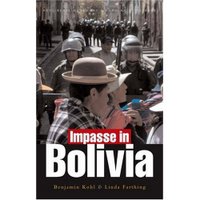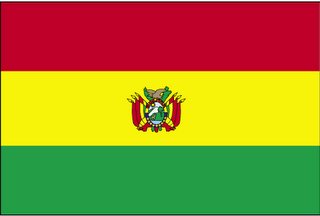
Leaders of Bolivia's richest provinces planned massive street protests on Friday to demand greater autonomy from the central government and more control of local taxes. Demonstrations took place in Santa Cruz, the southern city of Tarija and in Bolivia’s Amazonian northeast at Trinidad.
Protesters and their rivals hurled rocks at each other in San Julian, a town about 70 miles northwest of Santa Cruz, injuring more than 20 people.
Demands for autonomy in Santa Cruz, Beni, Pando and natural gas-rich Tarija

-- four of Bolivia's nine regions -- have dogged President Morales since he took office in January.
The movement, which predates the Morales administration, has taken on fresh urgency amid a bitter fight over the president’s control of an assembly rewriting the Constitution.
Convened in August in the former colonial capital of Sucre, 250 miles south of La Paz, the Constituent Assembly has been given a year to write a new constitution. But after four months, the body has yet to write a single word.
Morales' Movement Toward Socialism party controls just over half of the popularly elected assembly rewriting the constitution, and the president says its simple majority is enough to approve individual articles in the document.
The conservative opposition, centered in Santa Cruz, Bolivia's largest and most prosperous city, says each of the hundreds of articles require a two-thirds vote, granting them more say in the new document but likely slowing its writing to a crawl.
The problem is the assembly's own vague bylaws, which state only that

delegates ``approve the text of the new constitution by two-thirds' vote'' before it goes to voters for final approval.
Santa Cruz is an opposition stronghold and many of its people feel they have little in common with the poor west of the country, where Morales has his support base. While denying any intention to secede, the opposition insists that the assembly bylaws require the document to be written by two-thirds of the assembly.
Meanwhile Morales argues that the rule means that only the constitution's final draft need pass by a two-thirds vote - and should it fail, the president has said he'll put the framework to a nationwide referendum anyway.
The opposition says the president’s backers have frozen them out of the writing of the new charter, and protest leaders decried what they see as Morales’ exclusionary tactics.

The mestizo and white middle and upper classes fear Morales aims to shut them out of the reform process and risk Bolivia's hard-won economic stability with socialist policies but these opponents of President Morales denied wanting a breakaway state.
Opposition to some Morales policies, such as his plan to redistribute idle farmland to peasants, is stronger in the east, while the western provinces, largely populated by Aymara and Quechua Indians, strongly support his policies.
Bolivia is roughly divided along ethnic and economic lines, with the resource-rich eastern lowlands home to more European-descended people, while the indigenous majority, who are relatively poorer, populate the western Andean plateau.
Morales dismisses the complaints of his opponents, saying that it is high time the poor majority of the country begins to take power from the rich minority.
``We've begun to take back Bolivia,'' Morales said, directing strong words at the business elite leading the autonomy movement. ``Now that they can't sell Bolivia, they want to divide

Bolivia, that's the basic issue. There will be no division.''
While acknowledging the protesters' right to march, Morales said earlier that any move by the eastern states to declare independence would provoke a military response.
Labels: Evo Morales Bolivia karah woodward

 Leaders of Bolivia's richest provinces planned massive street protests on Friday to demand greater autonomy from the central government and more control of local taxes. Demonstrations took place in Santa Cruz, the southern city of Tarija and in Bolivia’s Amazonian northeast at Trinidad.
Leaders of Bolivia's richest provinces planned massive street protests on Friday to demand greater autonomy from the central government and more control of local taxes. Demonstrations took place in Santa Cruz, the southern city of Tarija and in Bolivia’s Amazonian northeast at Trinidad.






